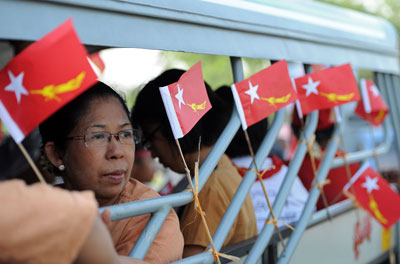Just ahead of this weekend’s highly anticipated Burma by-elections, opposition icon Aung San Suu Kyi today denounced the vote as not “free and fair.” Indeed, Thein Sein government’s harassment of opposition media in the run-up to the polls raises disturbing questions about the country’s reputed new democratic direction after decades of repressive military rule.
The Press Scrutiny and Registration Division (PSRD), the Burmese Ministry of Information’s censorship arm, has in recent weeks summoned and reprimanded the editors of two opposition-aligned newspapers, D-Wave and the Rakhine Nationalities Development Party’s (RNDP) journal, for articles deemed overly critical of the government, according to Mizzima, an exile-run news agency.
D-Wave was warned for publishing a political cartoon that depicted the PSRD as a chain restraining a news publication slugged “press freedom” from reaching clouds labeled “democratic sky.” The RNDP journal was reprimanded for publishing a February 29 article entitled “From a Green Military Uniform Government to a Yellow-Skirt Democracy,” which playfully poked at the recent transition from military to what at best can be called quasi-civilian rule.
Suu Kyi and her National League for Democracy (NLD) party have campaigned in part on the notion that Burma needs greater press freedom. Earlier this month, she told Radio Free Asia that government officials had censored a segment of one of her campaign speeches before it was aired on state-controlled media. The banned passage was critical of the previous military junta’s abuse of laws to repress the population. At her press conference Friday, she said irregularities went “beyond what is acceptable for democratic elections.”
Her speech violated an Election Commission list of forbidden campaign topics, including any speech that “tarnishes the dignity of the State,” “split the armed forces or tarnishes its good name,” or “disparages or otherwise harms national longevity, sovereignty, and ethnic unity,” according to an English translation of the Burmese language order received by CPJ. The nine-point list of banned topics has effectively muted critical debate on the campaign trail and as a result blunted any hard-hitting news coverage of the pre-election period.
After this weekend’s by-elections, the next big signpost on Burma’s reform path is expected to be passage of a new Printing Press and Publication Law. Ministry of Information officials have said the proposed legislation will codify press freedoms and responsibilities, and replace the PSRD censorship body with a new “Committee for Press Freedom and Raising Ethical Standards.”
Government authorities held two conferences, in January and March, on the promised media reforms, but participants left the meetings ambivalent about the government’s intentions and concerned that the new legislation will merely employ different tools of suppression, similar to the legal restrictions on the press in neighboring countries like Malaysia, Singapore and Vietnam.
There has been no indication that the regime intends to overturn the various repressive laws on the books, including the harsh Electronics Act that allows for jail terms for sending unauthorized information over the Internet. Authorities frequently have used the law to repress and imprison journalists. Those concerns were ironically underscored when the PSRD banned a critical commentary about the media reform conference written by veteran journalist Ludu Sein Win. The banned article was later published by The Irrawaddy exile-run magazine and website.
To be sure, Burma’s media freedom situation has eased with the release of at least 10 jailed journalists and the relaxing of censorship of certain previously banned topics. It is also noteworthy that prominent media editors in exile, including Irrawaddy‘s Aung Zaw and the Democratic Voice of Burma’s Aye Chan Naing — both steadfast critics of the old military order — have recently been granted short-stay visas to return to their homeland for the first time in decades.
But there are just as many signs, witnessed in persistent censorship and harassment of the local media, that President Thein Sein’s commitment to greater press freedom is still more rhetoric than reality. Indeed, journalists and editors quoted in news reports have expressed concerns that the marginally greater space they now enjoy will abruptly close if and when the government is rewarded for its democratic progress with the removal of Western sanctions and allocation of financial aid and assistance.
While Thein Sein’s quasi-civilian government has embraced the outline of democracy — witnessed in the spectacle of Suu Kyi campaign posters and voters feeding ballot boxes at this weekend’s by-elections — there is still clearly resistance to the substance.
